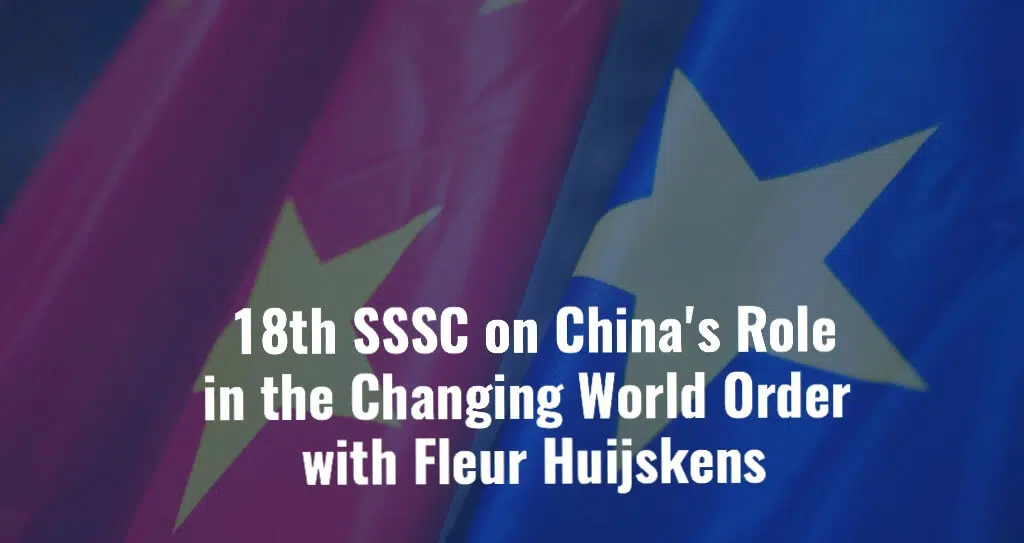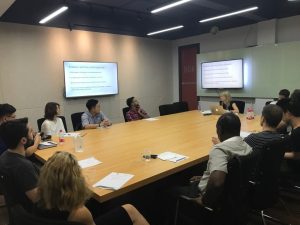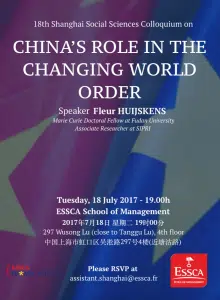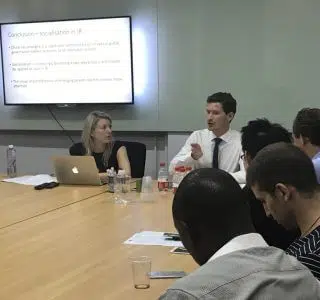On Tuesday, 18 July 2017, ESSCA School of Management organised the 18th Shanghai Social Studies Colloquium (SSSC) that featured a thought-provoking discussion on the future of global order and China’s role in it. Fleur HUIJSKENS, Marie Curie Doctoral Fellow at Fudan University and Associate Researcher at the Stockholm International Peace Research Institute (SIPRI), explained how China has been evolving from being a ‘norm-taker’ into an international ‘norm-shaper’ as well as an ‘institution-creator’. HUIJSKENS argued for the importance of bringing socialisation into International Relations (IR) theory.
From Norm Taker to Norm Shaper
IR theory still interprets socialisation along the lines of Alexander WENDT who argues for ‘normatively bettering the other’. Instead of continuing according to this paradigm of socialisation as a one-way process, HUIJSKENS advocated for IR theory to take into account learnings from socialisation studies and interpret the process of socialisation as a two-way process. This paradigm shift may help to understand China’s transformation from a ‘norm-taker’ to a ‘norm-shaper’.
Fleur HUIJSKENS claimed that the United States (US) under Trump’s presidency is in some aspects retreating from its role as leader of the global, liberal order. China, on the other hand, is stepping up its role on the international stage, defending globalisation and advocating to continue to uphold the liberal international trading system. Under these circumstances, the European Union (EU) is trying to develop its role as mediator and bridge-builder.
The topic raised a lot of questions and contributed to a lively debate with an audience composed of different backgrounds, ranging from academics in business and social studies to company representatives. Questions raised included whether China can proactively take the lead within the global order and become a responsible superpower, or whether it is rather reactively creating stability responding selectively to the challenges at hand? Taking into consideration China’s domestic governance model and the domestic developments, HUIJSKENS believed that China is not likely to become the world’s premier superpower in the near future. Despite the increased engagement within the global order, China will be an increasingly active but selective global player.
Socialisation in newly established institutions
The discussion also centred around the discussion of norms and values. It was mentioned that China is increasingly influencing the West, but that it is not pushing fundamentally different values or changing the established norms. Instead, it is merely perpetuating existing norms and values in its engagement with international institutions. However, given the scale and ambition of projects such as the Belt Road Initiative (BRI), and the establishment of the Asian Infrastructure Investment Bank (AIIB), it seems unlikely to have no effect whatsoever on norms and values.
Hence, China may not only develop ‘norm-shaping’ capacity but is also an ‘institution creator’. In these new institutions, socialisation is taking the form of two-way, reciprocal socialisation, HUIJSKENS argued. Socialisation can thus be defined as a two-way process, a socialisation process in which the West is no longer traditionally socialising the ‘rest’ into the Western dominated global order unilaterally, but in which existing and emerging countries are increasingly jointly shaping international norms and institutions as well as each other. China may be the most important emerging power in this regard. There is a possible shift towards political, economic and cultural reciprocity and engagement with China and the rest of the world.
The perception of China’s role in the changing world order remains a hot topic for discussion in academic circles, and engagement of representatives from other fields sheds more light on this issue. However, at this moment in history, we cannot give a definite explanation for changes that happen in the present, and only the future will unravel real intentions of China’s political and economic assertiveness. A key takeaway should be a modern understanding of socialisation; reciprocal socialisation allows partners to renegotiate the international order while mutually influencing each other.









